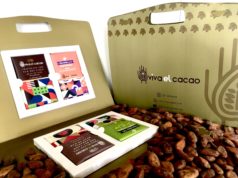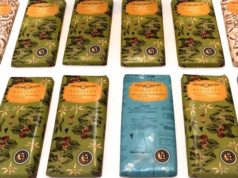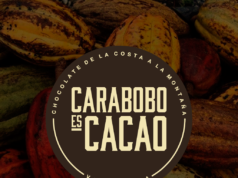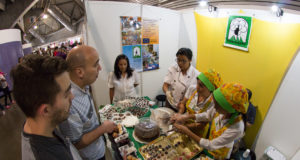In Barlovento, a few kilometres from the town Curiepe, in Miranda state, it seems that Birongo is hidden, and the story tells that it was so. This is a town founded by runaway slaves, rebels, fugitives escaped from Mantuanas colonial farms to settle in a place where they could run free. They went deep in the mountain and found a place along the river. This town has respected its roots for years. Its foundation was cocoa and now wants it to be again.
Text: Erika Paz (@erikapazr)
Photos: Raymar Velasquez (@raymarvelasquez)
The road to Birongo is tangled. When someone asks on the track where the village where the slaves hid is, everyone says: “straight”. The truth is we must overcome a few corners and intersections, follow the route to the mountain full of vegetation and then discover, crossing a bridge a small town whose central plaza is as modest as tiny is its church. This community is known by the sound of its drums, the magic of its spaces and the cocoa that sprouts from its soil. There are 300 plantations of this category since colonial times. They have endured for years; they have seen generations of families going through its crops. Not all of them are productive. Some found a way when nineteen descendants of local artisans decided to give a usage to cocoa, gold in seed they had there.

Sweat-scented chocolate
Before reaching the chocolate factory “Flor de Birongo” one can feel the aroma of this caloric sweet sin. At the door, Mercedes Zamora, Leonel Cardoza, Lupercia Blanco and a few other partners who make up the cooperative always receive visitors with a smile. This is the pride of the town and its residents, the positive answer to team work and the understanding of the importance of a product. Regularly there is a tour to visitors to narrate how the chocolates are produced within these walls as well as describe the path through producers went during nine years of struggle and efforts.
Mercedes says that they have cultivated cocoa all their lives, but before they used to sell it to foreigners who bought what they wanted paying what they decided. One day Empresas Polar arrived, and as a messiah, by its foundation, gave them the tools to set the base for a successful business. “A Swiss man” came and gave courses on confectionery and, so the experiment began at Lupercia’s home, “we started working a quarter of a kilo of cocoa,” said Mercedes, “I said, let’s take a chance and we will see that before reaching the bridge these chocolates will be sold, and so it was,” and she laughs “And our palates were not so exquisite as they are now, she says.
La Flor de Birongo produces about 1,200 squares of chocolate daily, which is distributed in Caracas, at Simón Bolivar airport in Maiquetia and in some other cities, thanks to the business owners who have opened their doors to the public and have become known through the tourism.
In this village they have learnt how to combine chocolate making with all the tasks they expect to help them sale the product. The tour of the chocolate farm consists in visiting the plantations and observing the harvest, fermentation, drying and roasting processes as well as what a tourist enjoys the most: the creation of the chocolate, the one made here very patiently and with the meticulous attention of a good craftsman.
They prepare filled chocolates, squares, toppings and a sweet which is the business emblem. They call it Triple X and it is made with almond cream, truffle liqueur, chocolate orange and peanut butter. Dilso Lobera, another partner, tells the visitors they have already learned the job, but now the task is to pass on that know-how to the next generation, thus the factory could remain active in time.
Mercedes looks, sighs and hand on her chest exclaims: “To me this work has given me everything I have.” The other 18 partners endorsed this statement.
Ancestral tradition
After the lesson of life left by the visit to this chocolate farm, the journey continues towards the river. You have to walk through a small forest and follow a path alongside the water for several minutes, to discover a well. There, Yorman Castillo, who calls himself “Professor”, was waiting. He says that he has always worked for the culture of his land. He explains that it is necessary for visitors and locals to know where they come from, in order to prepare their forthcoming life. At the beginning, he went from house to house trying to encourage the youngsters to become part of the group he leads: “Estrellas de Birongo / Birongo Stars”.
Nowadays, the boys of the community seek him, “many are interested in learning to play instruments, dancing, singing and understanding our story” You cannot separate the cocoa factory from the cultural activities this group offers, because chocolate was the inspiration for this community to become a village where everybody contributes to have it improved.
Las Estrellas de Birongo got prepared to show how they manage to make musical sounds with water. Castillo explains that this practice comes from colonial times. He says it was mostly a practice used by women when they went to wash their clothes at the riverside and being there, they used the “water drum” to call men to get loved by them.
The process appears to be simple but it has some difficulty. One has to rehearse a lot before getting a thud on the current. The idea is to form a sinkhole with one’s hands in order to produce an echo that simulates the sound of the hand on the leather drum. After this showing there is a party with instruments of the region.
The hospitality through food
The youngsters on Estrellas de Birongo play culepuya, quitiplás, guitar, four, almost any instrument that they can get. They know different local rhythms, but also they compose songs to share with tourists. When the show begins, there are village men and women carrying firewood, pots, vegetables and meats. A stew will be prepared on the river banks, the vegetables are peeled, chicken meat and ribs are washed. Among laughing, singing and cooking and a pleasant conversation it starts boiling the broth of happiness. They are the same people who were at the chocolate factory earlier.
Local women make the women guests something called bath of roses and consists in letting the female sorrows carry away by the river water. They spread flowers petals on them along with the liquid flowing through the track made by the sand and stones. Everyone laughs, the food is almost ready. A voice interrupts the song that has passed from original lyrics to local dances and even nostalgic lyrics. That call to stop the musical note means that the food is ready.
Now everyone takes “totumas” and spoons, line up for soup, sit on the riverbank and, the last activity of the day takes place, eat together with newly acquainted friends, sharing the table full of a town’s kindness, realising why their beliefs determine their destinations as well as their ancestors drove their future.
